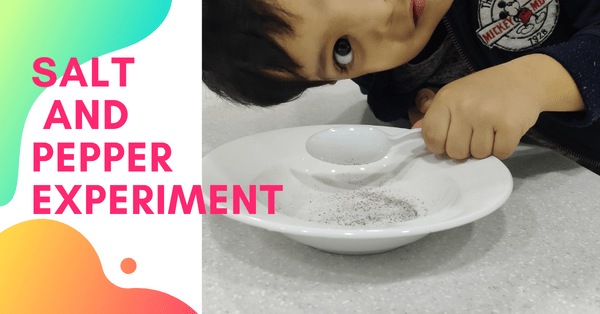Separate Salt and Pepper Experiment
Separate Salt and Pepper experiment is a simple science experiment where you only need few supplies. We love doing experiments with my son as Science Experiments are a perfect way to get children excited about science!
This experiment can be done with kids age 4 years and above.
The objective of the experiment is to accomplish the impossible feat of separating pepper from salt.
Supplies Needed
- 1 Teaspoon salt
- 1 Teaspoon pepper
- Plastic spoon

Procedure for Separate Salt and Pepper Experiment
Take 1 tsp each of salt and pepper and mix it together in a plate.

Then you ask your child if he/she has some idea or way to separate salt and pepper.
Now the magic trick! Rub the plastic spoon on your head for about 10 seconds and keep the rounded portion above the salt-pepper mixture. Keep the spoon one inch or so above the salt and pepper pile.

A few pepper particles will move from the plate to the spoon! The spoon will attract both salt and pepper. But if you keep the spoon in the right position, pepper will hop up and stick to the spoon. Don’t keep it very close otherwise the salt will stick too. The kids will be delighted to see the magic!
For four and five years old, it will be difficult to understand the concept of static electricity.
An explanation for Older Kids
You are giving the spoon a negative charge when you rub it on your hair. Anything that is negatively charged will draw objects that have a different charge.
Here plastic spoon is negatively charged and salt and pepper are positively charged. Positively or negatively charged materials display static electricity. Static electricity makes materials attract or repel each other. Materials with charges that are different attract, whereas materials with charges that are identical repel.
My son loved this simple and fun experiment and tried it over and over. You can also try different items such as comb and balloons instead of a plastic spoon.
Please comment and let us know if you will try or have tried the separate salt and pepper experiment with your child?
Our other Science Experiments
Soluble and Insoluble Experiment
Sink or Float Science Experiment
Water Glass Xylophone Experiment

